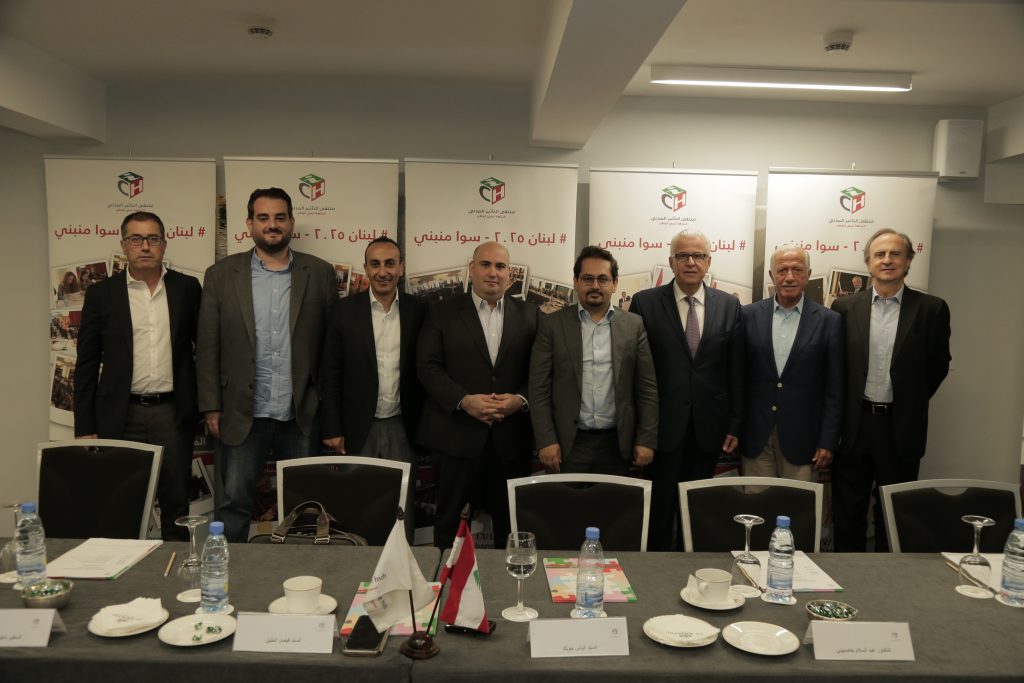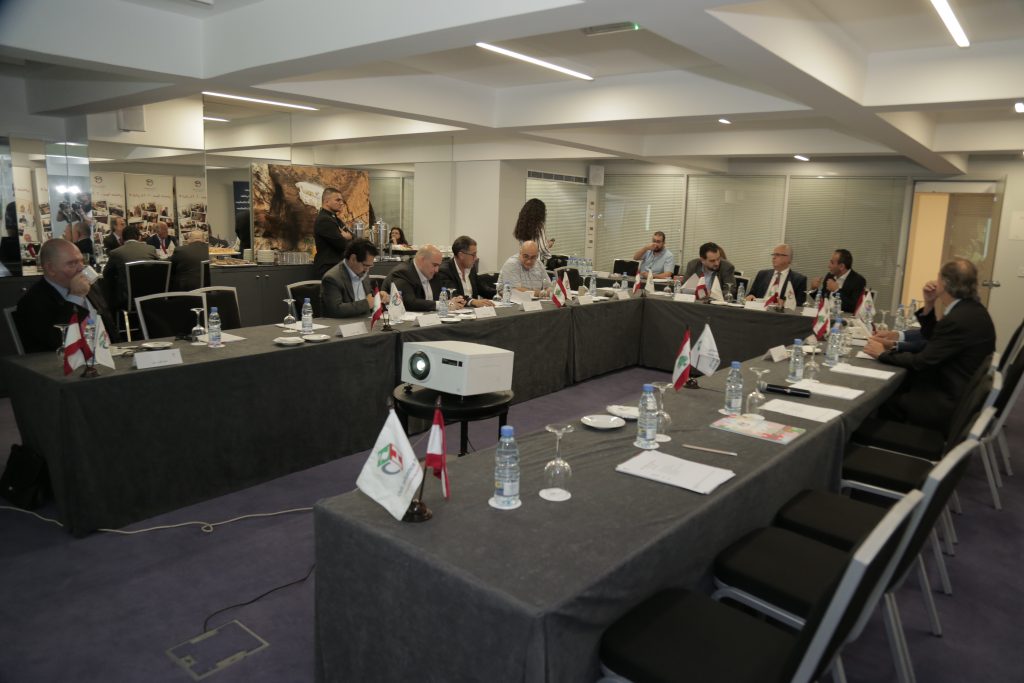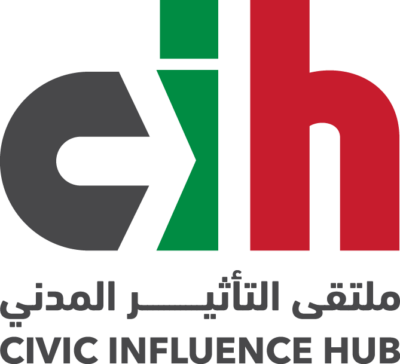National Initiative - Open Discussions
With the continued economic, social and political deterioration of the country and the mounting regional threats brought about by an explosive region, it has become of paramount importance for Lebanon’s civic community and its vital forces to launch a dynamic national dialogue that defines the areas of malfunction in government and sets the priorities and mechanisms for reform. Equally important is to reaffirm the viable and sustainable role of the civic community in shaping the future of Lebanon.
- Objective
- Scope
- Deliverables
- Establishing a cohesive and sustainable platform for the civic sector and its vital forces
- Launching a participatory mechanism on topics of change and priorities of reform that allows for a communal action.
- Elaborating a framework of civic cooperation to exert pressure on decision makers.
- Enhancing the richness, cohesion and unity of the civic community through presenting comprehensive initiatives on multiple levels.
- Maintaining periodic dialogues
- Establishing follow up committees
- Producing white papers on topics of change, priorities of reform and mechanisms of action.
- Collaborate on Organizing a National Civic Conference that produces common recommendations and a roadmap for future actions.
In March 2016, the CIH launched the National Initiative- Open Discussions & Round Tables in an attempt at finding common grounds among civic activists that allow for a cohesive participatory plan of action towards achieving a sustainable dynamics for change. The aim of this inclusive initiative was to establish a broad unified vision of a modern advanced Lebanon through finding real solutions for the chronic problems that the country has been facing on the economic, social and political levels due to decades of political failure and mismanagement of public affairs by the ruling class in the country.
This initiative included a wide range of Lebanon’s active civic community members across various sectors covering NGO’s, Municipalities, Economic Bodies, Syndicates, Universities, civic activists and the Lebanese intelligentsia. The three milestones of this initiative are to produce a Declaration of Principles, an Action Plan and a diversified Civic Platform that would exert the necessary pressure to effect positive change.
The Five Sessions of Dialogue
The CIH organized five national dialogues whereby over five hundred participants across multiple sectors were asked to present their perspective on three main questions:
- What the main problems that the country suffers?
- What are the solutions?
- What are the most effective mechanisms needed for action?
Over five hundred individuals participated in these five dialogues with a representative reach of over two million citizens. All the sessions were recorder audio visually.
The Policy Advisory Board
The CIH put together a Ph.D level Policy Advisory Board with the mission of breaking down all the answers, defining their main components, ideating a solution and prototyping a rough draft of the Declaration of Principles to be followed by a solution based participatory Plan of Action.
The Declaration of Principles of Citizenship in a Free, Just and Independent Civic State
CIH initiated a series of round table discussions engaging Lebanese academics and professionals who have distinguished themselves in national endeavors. These in-depth discussions led to the ideation of The Declaration of Principles of Citizenship in a Free, Just and Independent Civic State that now defines what our organization stands for.
- Lebanon is a legal entity having internal and external legitimacy. The Lebanese State, at all times, embodies and commits to all enacted laws and internal regulations, as well as all ratified international treaties and charters, most notably the Charter of the United Nations, the Universal Declaration of Human Rights and the Charter of the Arab League. read more
- The Lebanese Constitution and Lebanese law stand above all else, and cannot be superseded by any authority or government, by any private citizen or state official, nor by any right or privilege. They represent the source and regulating authority of all rights and obligations, and act as protectors and guarantors of legitimacy and sovereignty.
- Freedom is the norm, and authoritarianism the anomaly. Liberality is therefore the rule, and constraint can only be the exception, as subject to the law and the Constitution.
- Accountability is the core principle of responsibility, and legal immunity is a privilege contingent on well-conducted public office. As such, it is not intended to shield the abuse or misuse of authority, in a system of government based on the separation of executive, legislative and judicial powers, working together within a system of checks and balances.
- No other legitimacy can contest the Lebanese Constitution, as the fundamental basis for the stability of government, and the unity of land and people. A pluralistic, diverse and liberal Lebanon is a national, regional and universal necessity, and the chief requirement for building a citizen state.
- A citizen state is principally concerned with the individual, and upholds the rights of each citizen within a humanistic civic framework. Such a state would enact productive and inclusive economic policies, as well as social policies that promote justice and security, within a system of good governance.
- The Lebanese are citizens of a civic state, equal in rights and obligations, and enjoy the freedom of thought, religion and assembly. They are regarded as responsible and accountable, in a free, sovereign and independent country, without discrimination on the basis of gender, religion, race or opinion.
- No distinction can be made among the rights and obligations of citizens. The same legal protections should be afforded to all citizens and residents, as inalienable rights that cannot be arbitrarily granted or denied, under the rule of law and justice.
- Combating corruption, in all its forms and various repercussions, is a national obligation and a moral imperative. The pinnacle of corruption is for citizens to be made to choose between their conscience and their interests, their security and their freedom, or their livelihood and their dignity. In all this lies systemic corruption.
- Public space is the property of all Lebanese without distinction, and is only restricted by virtue of public interest and to maintain the balance between the public and private spheres. The same applies to participation in public affairs, which is a constitutional right enjoyed by every citizen, and conditional only upon legal eligibility.
- A life of dignity and sufficiency is a right enjoyed by all citizens and residents. As such, it can only be guaranteed by providing a clean environment, balanced and comprehensive development, compulsory education, social security and public healthcare, in a decentralized civic welfare state, enjoying social justice and the rule of law, and upholding human rights, public liberties and individual freedoms.
- The country’s public funds, as well as its natural resources and wealth, belong to all the Lebanese. Every citizen and resident is entitled to benefit from them, as they are integral to a dignified standard of living, which the state has the obligation to provide and safeguard, with justice and equality as its sole consideration.
- Preserving Lebanon as a state, ensuring its continued governance and preventing it from turning into an arena of conflict, is contingent on extending its sovereignty over its entire territory, controlling its international borders, and ensuring its monopoly on sovereign decisions, most prominently decisions of war and peace, and of defense and foreign policy.
- Positive neutrality in dealing with regional issues and conflicts, as well as a transparent foreign policy, should be adopted, in line with national interests and national security. The rejection of violence would guarantee the survival of an open, diverse, pluralistic and Arab Lebanon, and ensure the continuation of its cultural role in all domains, and the emulation of its democratic model of peaceful existence and transition of power.
- The ultimate condition for a legitimate government and a sovereign state is their acceptance by the Lebanese people, and there can be no legitimacy or sovereignty without abiding by and applying the very principles that such legitimacy and sovereignty were originally based upon.
Quantitative Results


First Meeting - Civil Society Organizations
January 27, 2016
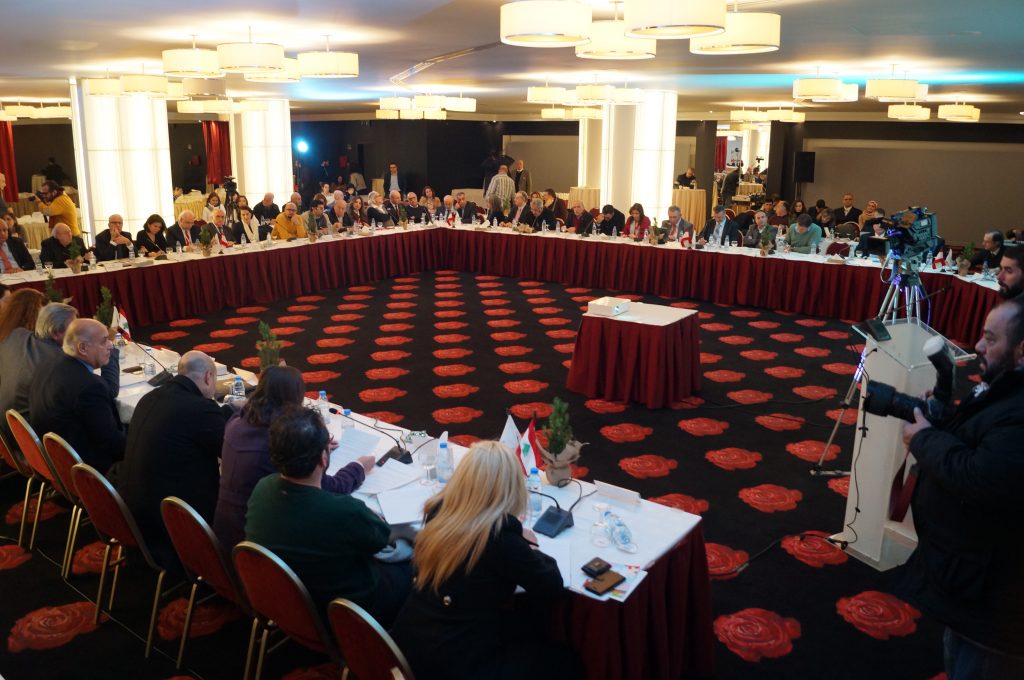
The Civic Influence Hub launched its national initiative for open dialogues in a first meeting of civil society organizations at the Monroe Hotel, where more than a hundred groups and organizations participated, a number of which forming coalitions to work on national reform issues. The first meeting, which was moderated by Ziad El-Sayegh, CIH’s CEO, was an open dialogue around three basic problems in Lebanon, the priorities of reform and the common mechanisms of action.Read more
Sakkal The meeting started with the Lebanese national anthem. The Chairman of the Board of Directors of the “Civic Influence Hub” Eng. Fahd Sakkal, gave a speech in which he said: “Our meeting this evening, carries several dimensions as it marks the launch of a national initiative in periodic open dialogues for all civil society sectors and vital forces. During these dialogues, national problems will be discussed along with the desired reform priorities in order to crystallize a road map for joint action. We know very well that you have carried, and still carry, the anguish of Lebanon and the pain of the Lebanese. We, at the “Civic Influence Hub”, share the same anguish and pain, and together we look forward to a better Lebanon through a comprehensive and productive national contract amidst good governance of State services, a true implementation of the constitution and respect for the laws, and implementation of the rights and obligations of all citizens. We hope to achieve a positive dynamic of change, together, because Lebanon and the Lebanese, through our unity, are worthy of hope in times of despair!”
Then a number of civil society officials followed suit: Princess Hayat Arslan gave a first speech in the name of the Civil Society Dialogue Table; followed by Esq. Nada Abdel-Sater on behalf of the “Lebanese Transparency Association – No Corruption”; Nimat Badr El-Din, in the name of the “We Want Accountability” (Baddna Nhaseb) campaign; Rafiq Kattan on behalf of “Our Unity is Our Salvation” (Wahdatouna Khalasouna); Dr. Makram Owais on behalf of the Lebanese Association for Democratic Elections (LADE); Ambassador Khalil Al-Khalil representing the Document and Constitution Commission; former MP Salah al-Haraka on behalf of the Lebanese Civil Coalition; Paul Abi Rashed on behalf of the T-E-R-R-E Liban; Retired Brigadier General Antoine Karim on behalf of the Civil Front ; Wedad Jarbou on behalf of the Samir Kassir Foundation; Hassan Al-Zein on behalf of the Committee for the Follow-up of the Civil Movement; and Ulfat Al-Saba on behalf of the Civil State Gathering.
Yehia The closing remarks were given by a member of the Board of Trustees of the Civic Influence Hub, Dr. Mounir Yehia, who stated: “Tonight we are not only holding a meeting, we are gathered to launch a permanent and continuous movement. We shall meet, at the same place and at an increasing pace, with unions, universities, economic bodies, student organizations, the media, and all sectors of the civil society. Every meeting will produce follow-up and coordination committees who shall hold a meeting to discuss consensual matters, so the civil society can prove its capacity to influence sound governance and build a comprehensive and productive national contract. The national initiative / open dialogues will extend over a period of one year and will be considered a space for exchanging ideas and galvanizing the energy and power of the civil society to determine Lebanon’s future.
Speeches
Arslan Princess Hayat Arslan considered that “the basic problem in Lebanon is the absence of national loyalty due to inequality before the law and discretionary justice. We have duties, we have rights, and things will not straighten unless we commit to this balance.” She continued: “The absence of civic education at school and at home, where upbringing begins … and the reform priorities to address these problems begin with a respectable, clean, non-corrupt authority and an accountable political class matched with a government that plans and develops a strategy and offers a timeline program. These solutions, if available, would secure a sound economic and productive situation create job opportunities and stop the youth brain drain.” She suggested mechanisms of action as remedies namely “raising public awareness about means and capabilities i.e. believing in themselves and relinquishing the slogan: ‘There’s nothing we can do’.” To conclude, she called for “an electoral law that secures real representation via: proportionality, women’s quota, the role of youth, condemning the political class for its corruption and nepotism.
Abdel-Sater Esq. Nada Abdel -Sater spoke on behalf of the LTA / No Corruption. She summarized the main problems as follows: The lack of state components; lack of trust between the state (politicians and administration) and citizens; the lack of citizenship; the absence of administrative and legal accountability; the lack of financial and administrative organization; presidential vacancy; extension of the parliament’s mandate; neglect of parliamentary elections; and absence of a budget. She considered the reform priorities to be:
• Disseminating a culture of transparency and good governance;
• Pushing for the adoption of the following e-government laws: the Right to Information Law; the Law on the Protection of Corruption Detectors to provide the serious political will to combat corruption by adopting transparency involving the civil society and the establishment and strengthening of the independence and effectiveness of anti-corruption bodies in accordance with the requirements of the United Nations Convention against Corruption;
• Developing a project for administrative, financial, economic, social, judicial and municipal reform;
• Raising civil society awareness in order to enable young generations in Lebanon to live a free future in a society where democracy, transparency and the rule of law prevail;
• Enacting and enforcing information exchange laws, protecting whistleblowers, preventing conflicts of interest, recovering assets, and implementing financial disclosure;
• Protecting anti-corruption activists and enabling civil society institutions to play their role as a major and effective partner in the fight against corruption;
• Reforming the judiciary and ensuring and enhancing its independence and effectiveness in preventing impunity;
Badr El-Din Moving on to Nimat Badr El-Din, representing “We Want Accountability” (Baddna Nhaseb) campaign. She wondered whether it was possible to agree on the problems: “Of course, regulators already know that there is a wide range of answers to this question. We do not start from scratch, which is what many consent to. And under the pretext of searching for participants, we end up with compromises that make it difficult to polarize and which are not considered as a serious threat by the government. The problems are: the overthrow of the Taif Agreement, which was a step for addressing the problems identified at the time, i.e.:
• Sectarian political representation,
• Distribution of positions,
• Presidential nature of government,
• Neglect of the governorates,
• Absence of development,
• Administrative centralization, etc.
Dependence on foreign forces is related to the sectarian nature of the political regime, where religious leaders have transformed followers into expats. This situation has produced quotas in governance, power and administration, and complicity in grand corruption, as a necessity for the continuation of domination over social structures and thus strengthening the stability of the principle of quotas.
This has resulted in hegemony over the judiciary, security, oversight institutions, and the disruption of their roles. The hegemony of the neoliberal approach was carried through “the Hariri Policies,” a phenomenon that came with the advent of Rafik Hariri to power, and attracting the victorious warlords after Taif, i.e. Nabih Berri and Walid Jumblatt. Any scientific and objective historian would summarize the era of the last two decades of the 20th Century as the era in which this neoliberal trinity dominated and led to the destruction of the State, privatization, disrupting the public sector, and generating parallel administrations and extensive debt. The biggest problem lies in the continued division over the elements of Lebanon’s national identity. From a legal standpoint, when a judge says, explicitly, that they cannot rule in some cases because they fear for their position or their life, then amending and reforming laws becomes a matter of principle that does not translate into reality. And when a high-ranking honest official refrains from executing ministerial orders to remove encroachments on the public domain, it becomes blatantly obvious that implementing laws, no matter their quality, becomes impossible. During our recent endeavor to put pressure on the Judiciary, oversight, and inspection authorities, it became clear that there is great difficulty (not to say impossibility) in activating their roles in accordance with the principles for which they were established. These facts lead us to a reality over which disagreement is no longer understood. This great political, financial and administrative corruption is a structural necessity for the continuation of the political quota system, especially with the scarcity of external resources that used to help leaders nurture their leadership after they had eliminated state services and replaced them with the services they provide, so as to ensure the loyalty of their followers and the masses. Therefore, what must be done in order to achieve reform is, first and foremost, the reform of the political authority and the consolidation of its constitutional reference; that is, the implementation of the “Taif Agreement” as it is, or after its development, if necessary. The way to do this is to hold the parliamentary elections swiftly according to a modern law and on the basis of proportionality and one-district constituency. Likewise, it became necessary and possible to impose popular oversight, starting today and after the restructuring of the authority. People’s participation in deciding their own destiny is possible even if the authority is closed to representatives of people protest and public opinion, with the power of the street and the support of the public opinion.” She focused on restructuring the regime on the one hand, and perpetuating and activating popular oversight, on the other, because they are two vital goals that have priority in our view of the imminent reform. She explained that the Campaign continues to work on two important files: activating the work of regulatory institutions and providing electricity on a permanent basis. Without these oversight institutions, any talk about a newly established state becomes empty and void. The State exists – that is true – but it is in a state of clinical death. This issue is of great importance should we seek to organize the widest political, media, popular and elite pressure campaign in order to activate the role of these bodies and empower them. We also call, for example, to focus on the implementation of the illegal enrichment law established 70 years ago. Joint action and unified focused efforts are required such as participating in all announced movements and various initiatives, in the areas of mobilization, incitement and promotion. But the most important thing is the participation of new groups in the campaign without necessarily quantitatively increasing the number of campaigns.
Rafiq Kattan, speaking in the name of “Our Unity is Our Salvation,” called for overcoming personal, institutional, sectarian or regional interests for the sake of public interest. He summarized the main problems in Lebanon as follows:
• A structural defect in the political system and, consequently, the administrative and socio-economic systems, and this constitutes a crippling factor for institutions as the state is divided into spoils gained by a group of politicians, and citizens turn into clients, without any accountability, divided along sharp sectarian alignments serving foreign agendas.
• The crippled Judiciary due to structural, material, and political reasons, and consequently the slackness of oversight bodies, the spread of administrative and financial corruption, the lack of transparency, and the consolidation of nepotism instead of accountability.
• Lack of citizenship in the relationship among individuals and between individuals and the State, due to the dominance of the clan and religious sects.
• The socio-economic policies neglect of sustainable human development because of special and immediate interests (the relationship between politicians and funds) to turn our economy into a rentier economy.
• A burdened centrality that lacks flexibility and the mechanisms necessary for development, which makes it impossible to meet the challenges of underdeveloped public services.
Kattan enumerated the reform priorities:
• Perhaps the founding conditions for modernity are not only cognitive, scientific, and material; they are also found in the new social culture – where citizens and groups unite around common interests.
• Linking democracy to ethics promotes individual rights and freedoms as an expression of a free will to unite.
• Strengthening the discourse of the civil society, where citizens are united, as an expression of free will.
• Reinforcing the civil society discourse whereby citizens are bound by a joint contract of interests and where freedoms are preserved, and rights and obligations are mutually recognized.
• Decisive implementation of the constitution and electing a President of the Republic
• Re-establishing authority through elections held on the basis of a just law that reflects equitable representation of the people, upholds the methods and principles of true democracy, reforms the political and administrative system, limits sectarian behavior, strengthens citizenship and adheres to the principle of the national identity of the Lebanese people as a civilized option while respecting differences of opinion, emphasizing the importance of pluralism as a positive element, rejecting violence in all its forms, protecting the human rights of individuals and groups, ensuring effective separation of powers, especially the judiciary, and the adoption of decentralization as a contribution to balanced development, and the adoption of a modern partisan law.
Oueiss Dr. Makram Oueiss gave a speech on behalf of the Lebanese Association for Democratic Elections, in which he said: “With the extension of the Parliamentary mandate twice and in light of the apparent paralysis of the government and the external influences that none of the political parties is ashamed to divulge, the Lebanese citizen remains the only victim. The political crisis we are experiencing today has produced a number of other crises. Foreign investments in Lebanon decreased from $4.84 billion in late 2013 to 2.5 billion in late 2014, for example.” Public debt exceeded 70 billion dollars, in the absence of any reform economic plan, private debts increased and reached 55 billion dollars at the end of 2014, i.e. 110% of the GDP (this means that companies in Lebanon no longer have collaterals to present in order to borrow from banks with the aim of investing and expanding their business). Consequently, trust between citizens and institutions, most notably Parliament and the government was tarnished; the level of trust declined in recent years and plummeted to 2% mid last year, (2% in the government, and 4 % in Parliament), according to a national survey conducted by the association out of a sample of 2,500 people. The main problem since the end of the 1975-1990 war is the dominance of warlords over all decision-making outlets, political, economic and social. And their continued use of the war mentality in managing the country’s affairs regardless of the interests and rights of citizens, which has brought the country to its current state. How can we achieve any breakthrough under this junta which acts as if the country is here to serve its narrow interests, and bends the laws or decisions to serve its welfare. The main hindrance to development in this country is clearly its political structure, an integrated clientele system that we have been suffering from for decades, not to mention the consequences of the regional conflict, which is getting more complex by the day as a result of the internal rifts. Remedies will require time but needs to be preceded by the following:
• A fair electoral law based on proportional representation in large electoral districts to improve representation and secure a mechanism for representing the various segments and components of society;
• The adoption of a number of electoral reforms namely ensuring the secrecy of the vote through the adoption of unified ballots, capping electoral spending to reduce vote buying and bribery;
• Granting women their right to representation through the adoption of a temporary women’s quota, in addition to reducing electoral age (voting and candidacy) and involving expats in the election process.
This law will bring fresh blood to Parliament and empower young people and women to reach Parliament with new ideas and programs; let alone increasing transparency and accountability and enhancing the role of the judiciary system.
These reforms will restore confidence between citizens and their institutions and between citizens and political parties, and reinstate transparency and accountability between the people, parliament, and government. This mechanism will not roll out tangible change at first, but will, at least, tear down this wall and create a catalyst for the change needed in subsequent parliamentary sessions. It will ultimately push the political parties to implement a series of internal reforms. He stressed the importance of respecting constitutional deadlines and holding parliamentary or municipal elections on a regular basis and in due dates. Elections are the first solution to crises and not a cause of the latter. All countries in the world resort to elections to solve the political crises they face, as they consider them as the means to restore confidence between the citizen and the state. What the stakeholders can do today to break the vicious circle is to show solidarity and push the political authority to take a bold stance to bring the country back on the right track and stop running away from responsibilities. To the political class, we say you are going against the normal course of things, and history will remember that you squandered valuable opportunities that were leading Lebanon and the Lebanese to safety and progress. Establishing a strong coalition that brings together civil society bodies, economic bodies, unions, universities, the media and political parties committed to reforms is the best solution to confront this situation. The basic requirement, in our opinion, should be to restore confidence in institutions through a just and developed electoral law. As for the time being, what we have to unite for is the holding of municipal and mukhtar elections as scheduled in May 2016, especially since the municipalities are the last legitimate bodies currently elected by the people, in addition to the fact that municipalities are close to people, and any disruption in their work could directly affect people’s daily lives. Therefore, we ask today and as soon as possible from all political parties to take clear and binding positions regarding these elections and assume their responsibilities, especially since the overwhelming majority of the Lebanese people are in favor of holding these elections in due time. Nearly three months ago, LADE launched the #el baladiyeh_nos_elbalad campaign (Municipality counts for half the country) which highlights the importance of the role that municipalities play and press for holding municipal elections on time. It is crucial to join efforts before is too late and before democracy falls apart. Postponing the municipal elections will be catastrophic for the country and all its components. Now is the right time to act, and take a decisive stand and spare no effort to restore civil and political rights.
Al- Khalil Ambassador Khalil Al-Khalil, representing the Document and Constitution Commission, pointed out in his speech that Lebanon’s forever problems are:
• sectarianism its spillover and misuse.
• National identity and the great rift it caused.
• Disrespect to the constitution and the law.
• Commitment and acceptance of external interventions.
• Palestinian presence on Lebanese territories and the lack of resources.
And worst of all are sectarian, fanaticism, sectarianism as used in politics, profaning the concept of coexistence, attacking legitimacy and falsifying democracy through successive electoral laws to reproduce the same authority.
The problem is that Lebanon as an entity and land is not the same for all the Lebanese. The Lebanese people cannot non discriminatorily chose where to live and reside as their choice is conditional upon sectarian and doctrinal affiliations. Authority and institutions do not stem from the people; and national consensus should not mean gathering opposites and crowding opposite and hostile parties into one government which will result in bickering and quarrels. Poor power supply and water shortage amidst waste piles reflect the lack of capacity to govern and bad faith.
Al Harake. Former MP Salah al-Harake spoke on behalf of the Lebanese Civil Coalition. He said: The Lebanese law mechanisms, if implemented, would help solve problems and manage the affairs of the state and citizens. The problem does not lie with the law, but with a number of politicians who control power and have wide popular support, play on encouragement, intimidation, or sectarian affiliations. The law provides for oversight and control mechanisms to monitor the work of ministries, parliament, institutions, and the Judiciary. However, the implementation of the law is left to the whim of a selfish, corrupt and interest-driven political class that feeds on quotas, nepotism and the accumulation of wealth at the expense of the country and citizens, encouraged by a sluggish rotation of power. Unfortunately, voting was driven by purely sectarian instincts to protect communitarian interests. While seemingly supporting reform, the Lebanese people only blame others for corruption; seeing the splinter in the eye of their brother but never noticing the beam of wood in their own eye.
1- The main problem: selective implementation of laws.
2- Reform priorities: educating citizens about their interests as citizens; exposing all sources of corruption; raising awareness about the rights and duties of citizenship, similarly to any state in the modern world.
3- Harmonizing opposition movements and groups including in particular waste management groups (sorting, landfilling and exporting waste).
Finally, civil state is the only solution.
Abi Rashed
Representing Terre Liban, Paul Abi Rashed defended environmental security, as pollution threatens individual and national health and wealth namely nature, water, weather and soil. Among the environmental problems: unorganized urban expansion, quarries, random dams, sea filling, indiscriminate fishing, and finally solid waste problem which exposes the impotence of the political class. These are mainly due to:
• Unrestrained media;
• Consumption-oriented society;
• Treatment monopoly;
• Marginalized municipalities;
• Lack of transparency or openness with municipalities about the real prices of collection and treatment;
• Centralized solutions,
• Burdening one region with waste management;
• The gap between the state, municipalities and the civil society;
• The lack of accountability by municipalities and civil society;
• The violation of environmental laws and air, water and sea pollution;
• Bribery to silence opponents;
• Corruption and contracts breach;
• Nepotism and quotas;
• Power abuse and conflict of interests;
• Syrian displacement crisis;
• The impact of monopoly and privatization on the economic and social situation.
Karim Retired Staff Brigadier General Antoine Karim, who spoke on behalf of the Civic Front, saw that reform starts with politics, stability and security. It requires:
1- Activating the judicial and security accountability authorities
2- Replacing the roll-over project that produced the corrupt class with a reform project that reproduces power through parliamentary elections
3- Media coverage
And it was suggested that on the short term, funded and purposeful rallies would be held to maintain pressure on officials (survival requirements, pressure on a certain official to expose and sue him…); on the medium term, preparing for the upcoming parliamentary elections, no matter the electoral law on grounds of a reform program. This requires awareness raising about to the electoral duty; and on the long run, encouraging youth involvement in preparation of the future.
The Second Meeting - Economic Stakeholders
March 03, 2016
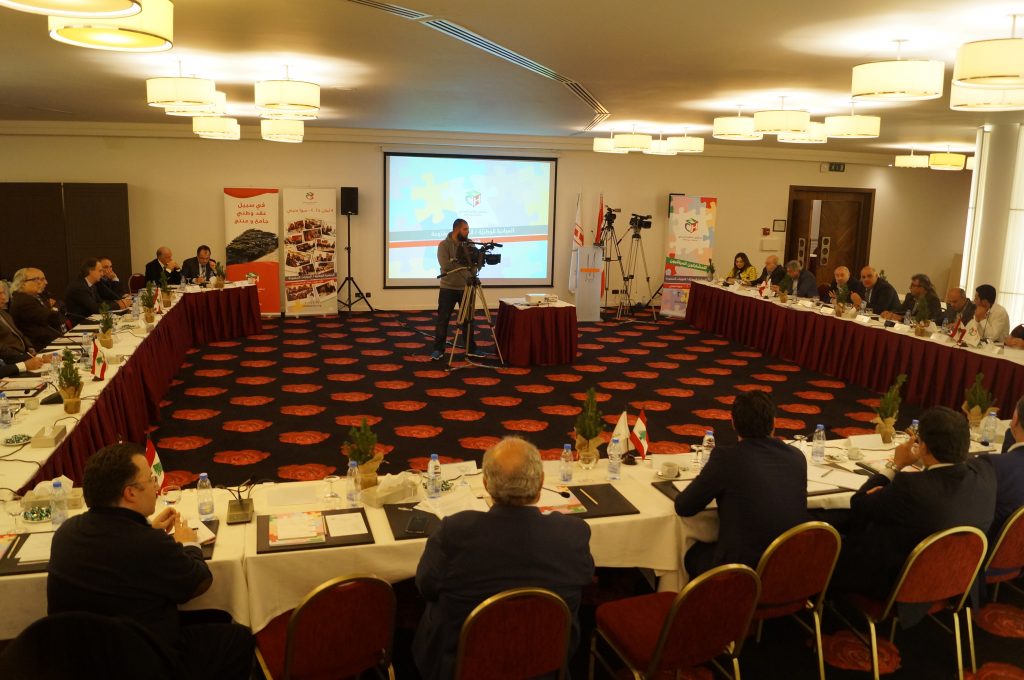
Third Meeting – Trade Unions of Liberal Professions
April 19 2016
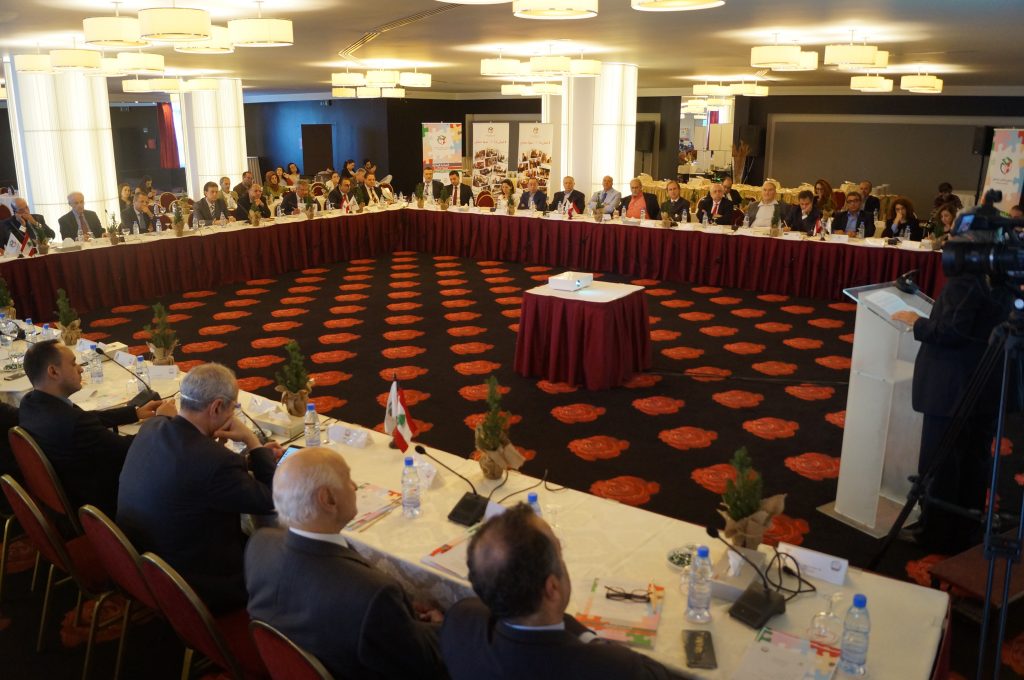
Fourth Meeting - Municipalities
November 24, 2016
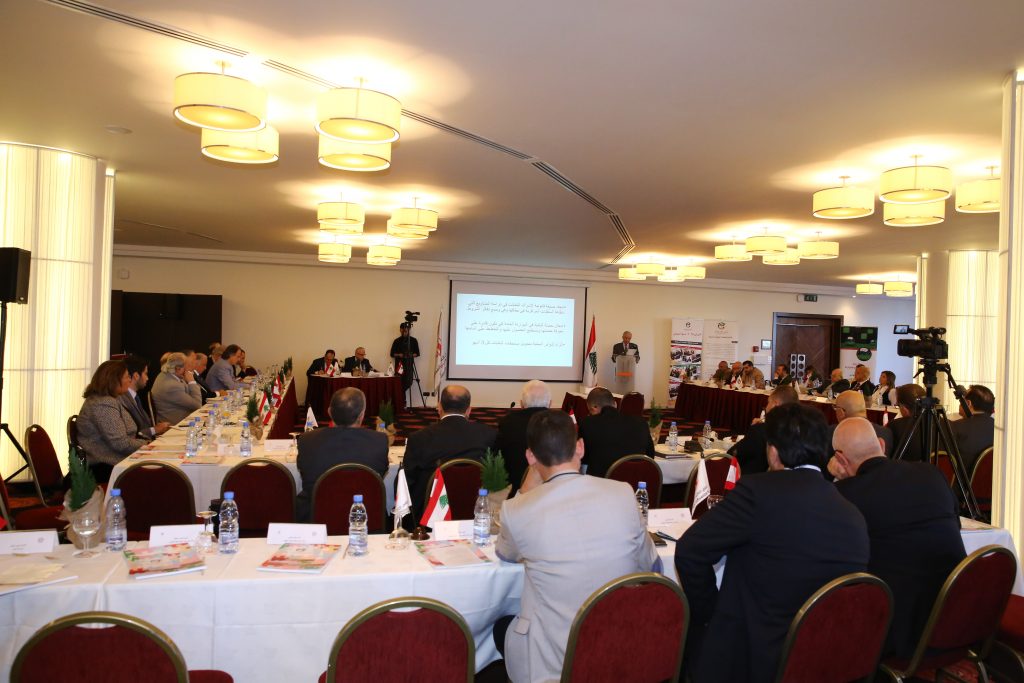
Fifth Meeting - University Students
February 8, 2017
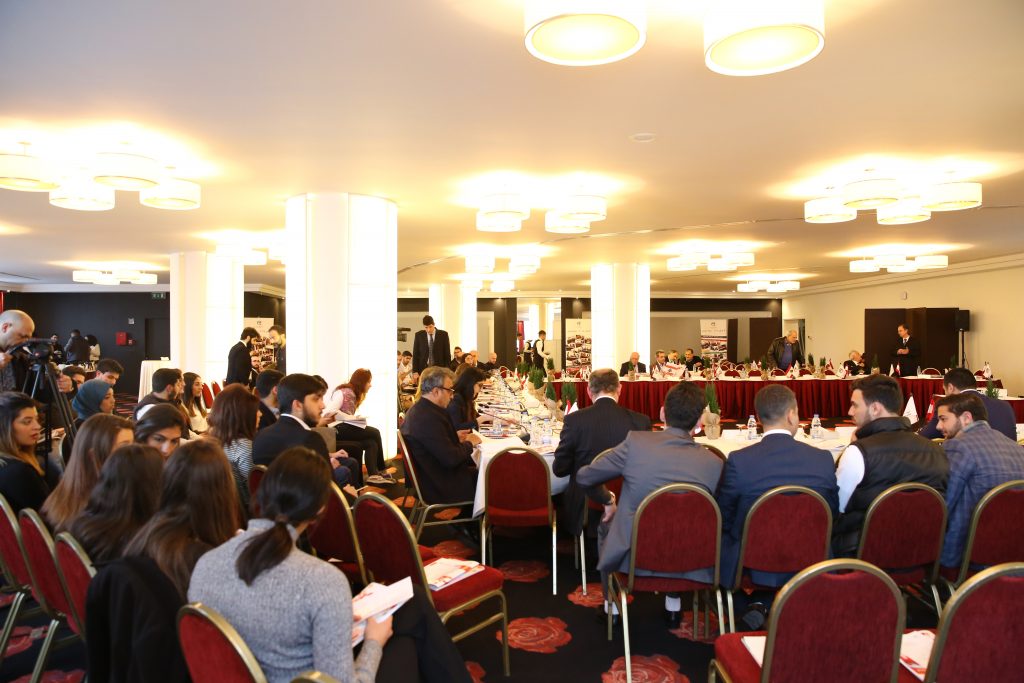
The Dialogue table
June 28, 2016
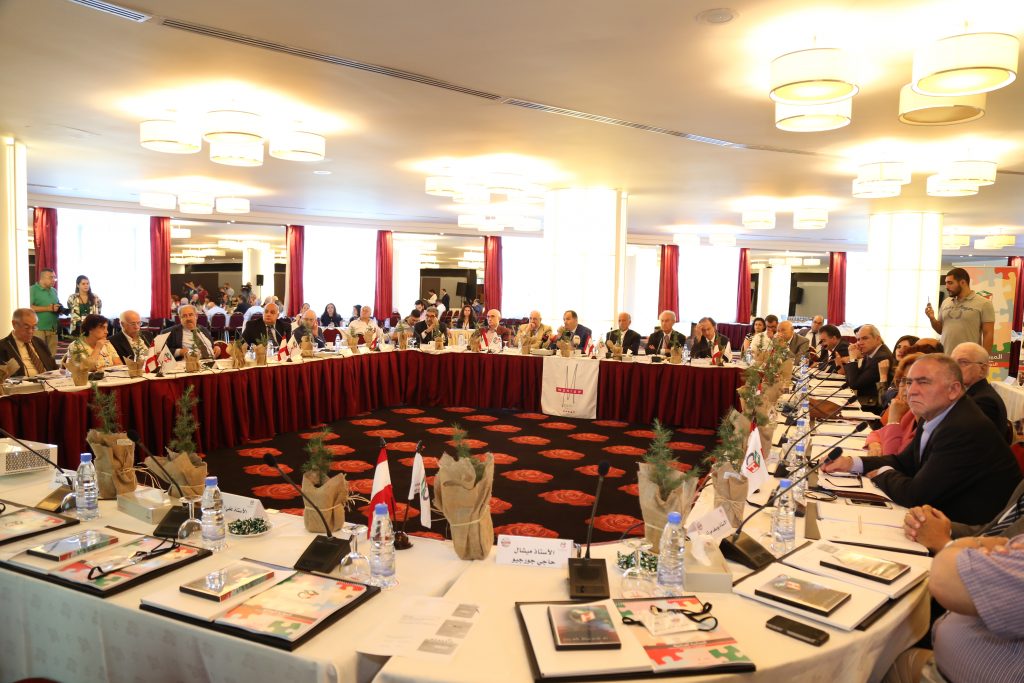
Civic Consultative Meeting
December 9, 2017
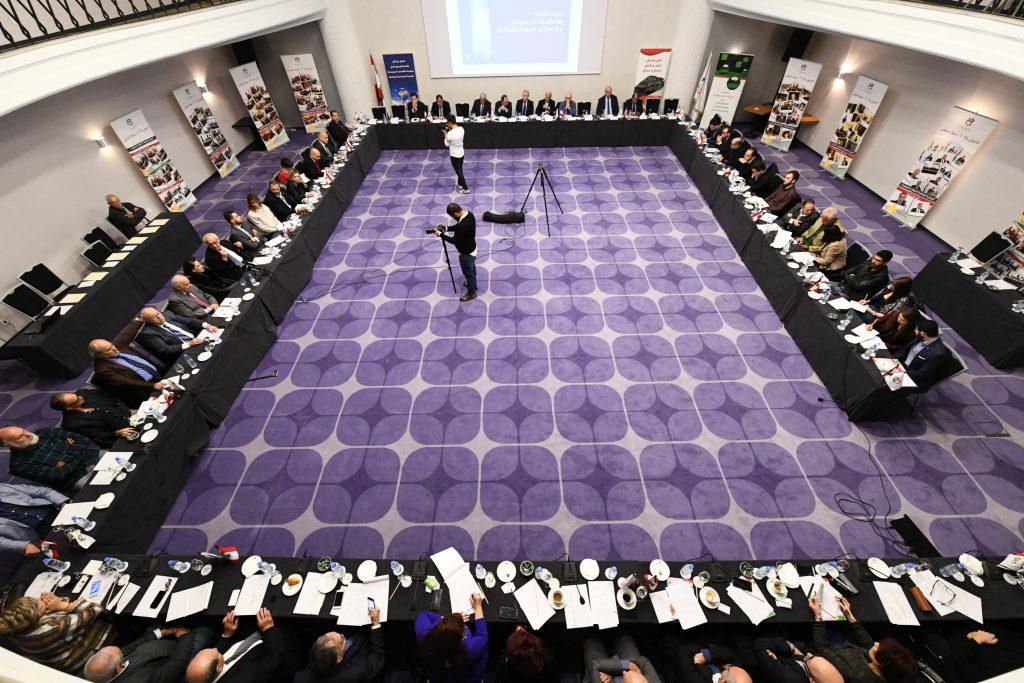
The Civic Consultative meeting on developing the "Declaration of the Principles of Citizenship in a Free, Just and Independent Civic State"
August 6, 2018
